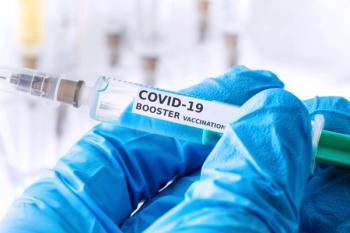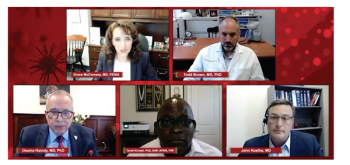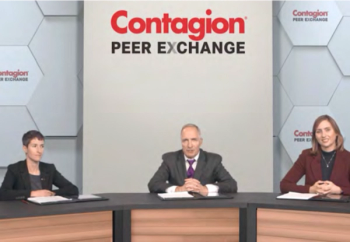
Clinicians discuss screening and treatment approaches for the disease.

Clinicians discuss screening and treatment approaches for the disease.

This discussion revolves around diagnostics for viruses and best practices and challenges.

Clinicians offer insights on the individual respiratory viruses as well as addressing management of coinfections.

"It does take the immune system a while to build up antibodies and recover," said Madeline King-Patel, PharmD, BCIDP, "So you don't want to give the vaccines too close to each other, or you're not going to get the full benefits."

Panel moderator Rodney Rohde, PhD, notes that word choice is important and clinicians should emphasize the COVID-19 vaccine is not a live virus but is instead designed to challenge the immune system to protect against the virus.

"We made a mistake," said Wendy Wright, DNP, ANP-BC, FNP-BC, FAANP, FAAN, FNAP. "We needed to have a 3-dose primary series and not call these booster shots.”

“In the long run, what we will have is a virus that will become endemic in our population," said Donald J. Alcendor, MD. "The idea of thinking we can chase variants with boosters is a failed effort. We must realize that.”

“Vaccines are the most highly scrutinized public health interventions we know,” said Donald Alcendor, PhD.

Clinicians offer insights on a variety of elements surrounding boosters.

Medical professionals discuss how they affect immunity as well as the necessity of these additional vaccinations.

For people living with HIV, age-related comorbidities, such as obesity and diabetes, as well as quality-of-life issues remain challenges. Our Peer Exchange panel discusses clinical approaches for this patient population and trying to keep them in good health.



Investigators apply guidelines into practical management strategies.

Experts discuss the bacteria’s transmission in the community setting, how to reduce disease and economic burdens, and ways to improve quality of life for patients.

The biweekly webinars hosted by renowned health care thought leaders provide resources to improve patient outcomes during COVID-19. Here's a recap of the first 5 discussions.

An expert panel discussion around long-acting injectables' role in both preventing and treating HIV.

Although overall incidence rate has declined slightly in recent years, increases in the incidence in certain subgroups emphasize the importance of early diagnosis, risk-based screening, and PrEP for at-risk individuals.

Dr. Goff and Mr. Nosta discuss how to use Twitter to communicate about infectious diseases and antimicrobial stewardship.

Key considerations when choosing a treatment for gram-negative nosocomial infections include the patient’s referring facility.

Gram-positive multidrug-resistant infections may be managed effectively with a single dose of long-acting lipo­glycopeptide antibiotics in the outpatient setting; however, careful patient selection is important for maximizing the cost-benefit of these relatively expensive drugs.

Patient and institutional history, as well as the individual niches of the new antibiotics, need to be considered when selecting a treatment for gram-negative infections.

Expert panelists in the field of infectious diseases discuss the growing threat of antimicrobial resistance.

Contagion® Peer Exchange panelists attempt to reach a consensus on the existence of chronic Lyme disease.

Contagion® Peer Exchange panelists discuss the challenge in diagnosing Lyme disease and new technologies that can improve testing.

Although focused in the northeastern United States, Lyme disease has ex­panded geographically over the past few decades, with a >320% increase in the number of high-incidence counties and reported cases in 49 states.

Published: September 30th 2022 | Updated:

Published: August 11th 2017 | Updated:

Published: November 10th 2017 | Updated:

Published: February 23rd 2018 | Updated:

Published: April 24th 2018 | Updated:

Published: June 22nd 2018 | Updated: